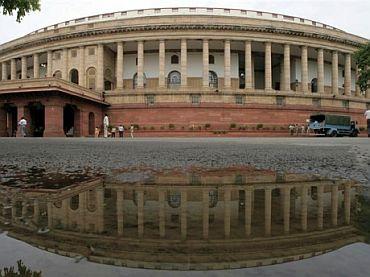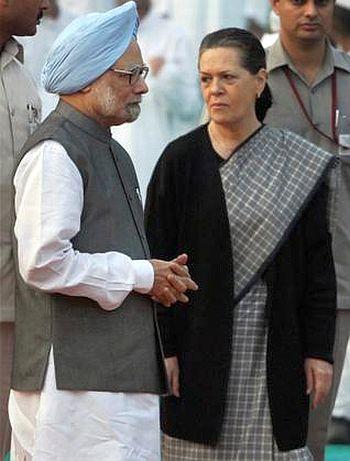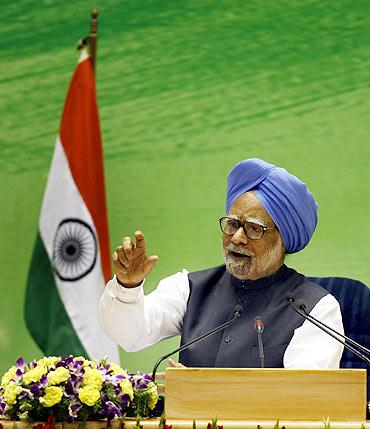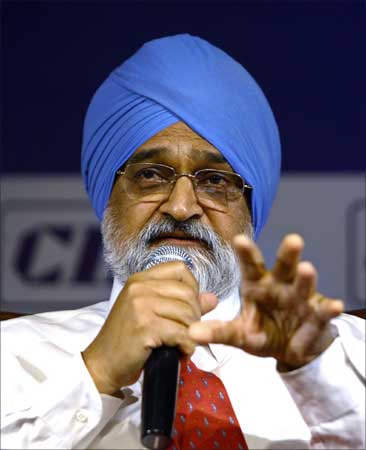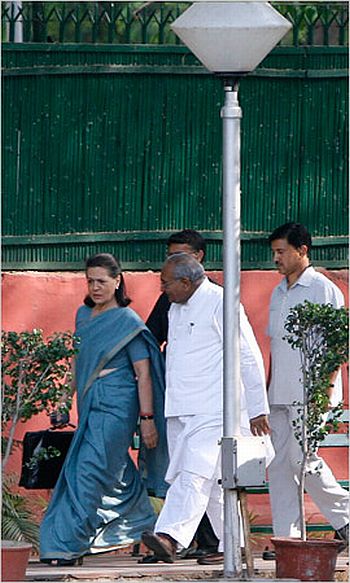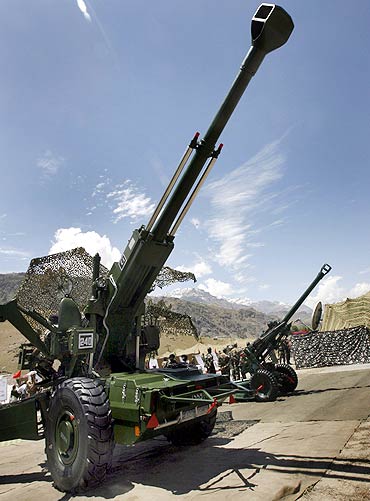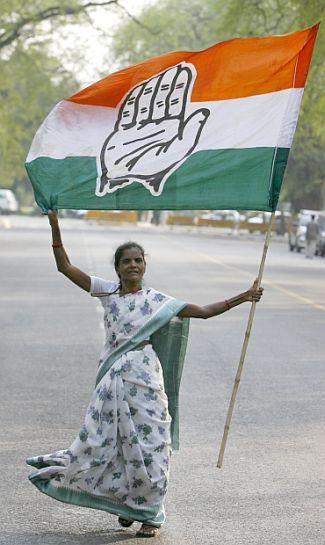 | « Back to article | Print this article |
All is not well inside the Congress party
Neerja Chowdhury analyses the tussle within the Congress party
Rajya Sabha member Janardan Dwivedi, who is also media head of the Congress party, is considered no orator. Nor is he usually fielded as the opening batsman in Parliament to defend the government. When, as the first speaker standing up for the beleaguered ruling party, he chose to deliver philosophical homilies targeting the prime minister, it naturally raised eyebrows.
Speaking on the motion of thanks to the president's address in the budget session, Dwivedi chose to quote an article by Mahatma Gandhi written in 1920, 'Why Am I in Politics?'  Gandhi had said that while he was in politics, he had not allowed political considerations to shape any of his major decisions, and had instead fought its 'vice-like grip'. To the layperson, the words appeared harmless. But in the context in which they were uttered, they were laced with meaning.
Gandhi had said that while he was in politics, he had not allowed political considerations to shape any of his major decisions, and had instead fought its 'vice-like grip'. To the layperson, the words appeared harmless. But in the context in which they were uttered, they were laced with meaning.
Click on NEXT to read further...
All is not well inside the Congress party
Leader of the Opposition in the Rajya Sabha, Arun Jaitley, lost no time in running with them, saying that Dwivedi, considered close to 10, Janpath (Congress party president Sonia Gandhi's residence) was delivering not a 'subtle' message to the prime minister, but a 'blunt' one.
Prime Minister Manmohan Singh's recent defence of his decision to re-induct Andimuthu Raja as telecom minister in May 2009, putting the blame for his action on the 'compromises' necessary in coalition government, had obviously not gone down well with the Congress party leadership.  Though he did not say it in so many words, Dr Singh was alluding to the pressures he was under from his party to take back Raja with coalitional ally Dravida Munnetra Kazhagam pushing for his re-entry.
Though he did not say it in so many words, Dr Singh was alluding to the pressures he was under from his party to take back Raja with coalitional ally Dravida Munnetra Kazhagam pushing for his re-entry.
The Dwivedi episode is one more sign that all is not well inside the Congress party.
All is not well inside the Congress party
The internal tussle is happening at two levels. The government and the Sonia Gandhi-led Congress party are pulling in different directions. Then there is an ongoing battle between the top leaders in the government; and this too is no longer a secret in Delhi's power circles.
Senior leaders in government seem to be working at cross-purposes. Home Minister Palaniappan Chidambaram and Finance Minister Pranab Mukherjee do not often see eye to eye on issues.
The sharp exchanges reportedly made between the two at a cabinet meeting not long ago on the proposed 40 per cent increase in the price of foodgrains for above-poverty-level families -- heatedly using the word 'immoral' -- is a case in point.  With Dr Singh's image getting besmirched for the first time, and with the Congress party's prince-in-waiting Rahul Gandhi showing no inclination to take over the reins of government -- or, for that matter, of the party -- several senior leaders have been positioning themselves in the event of a vacancy getting created.
With Dr Singh's image getting besmirched for the first time, and with the Congress party's prince-in-waiting Rahul Gandhi showing no inclination to take over the reins of government -- or, for that matter, of the party -- several senior leaders have been positioning themselves in the event of a vacancy getting created.
All is not well inside the Congress party
But in the last two weeks, Prime Minister Singh, who had otherwise looked miserable throughout 2010, made it clear that he had no intentions of walking into the sunset.
There is intense speculation on the leaks into the various scams, which have hit the headlines recently. Those who should know acknowledge that expos s of the magnitude of the 2G spectrum scam and the now annulled Indian Space Research Organisation-Devas deal -- and the way they have tumbled out without let-up -- usually take place when the powerful in the system fall out with each other.  It is hardly a secret that last month's much-trumpeted exercise to reshuffle the cabinet to remove the deadwood and energise the government ended in a whimper because Sonia Gandhi and the prime minister were not on the same page.
It is hardly a secret that last month's much-trumpeted exercise to reshuffle the cabinet to remove the deadwood and energise the government ended in a whimper because Sonia Gandhi and the prime minister were not on the same page.
All is not well inside the Congress party
Since the exercise was essentially one involving the Congress party and not the 'troublesome' allies, there was nothing to prevent Dr Singh and Sonia from effecting the changes they wanted to bring about. But this did not happen, despite six rounds of consultations.
From all accounts, Dr Singh had wanted to bring in Planning Commission Deputy Chairman Montek Singh Ahluwalia as finance minister in place of Mukherjee, make Mukherjee home minister and send Chidambaram to commerce and industry. That did not find favour with the party.  Finally, the exercise ended up with Dr Singh jigging around the portfolios of 35 ministers without penalising the non-performers, or rewarding the performers, or inducting young blood, or sending out a message that the Congress party was serious about countering corruption.
Finally, the exercise ended up with Dr Singh jigging around the portfolios of 35 ministers without penalising the non-performers, or rewarding the performers, or inducting young blood, or sending out a message that the Congress party was serious about countering corruption.
All is not well inside the Congress party
The differences revolve not just around personalities. The latest buzz is about resistance building up to the appointment of Pulok Chatterjee -- close to 10, Janpath -- as the next cabinet secretary when K M Chandrasekhar retires in June, and Chatterjee returns from his present assignment in Washington. That he would take over as the country's seniormost civil servant, was something that had so far been accepted as a given.
The differences are also ideological, and they have contributed to the drift in decision-making. These have manifested on the scope of the food security bill, which the government had promised to bring.
Sonia had hoped that food security would be to United Progressive Alliance II what the National Rural Employment Guarantee Act and the Right to Information Act were to UPA I, yielding electoral dividends for the Congress party in the 2014 electoral round.  But the prime minister's Economic Advisory Council rejected the Sonia-led National Advisory Council's proposals -- to cover 75 per cent of the population, 90 per cent rural and 50 per cent urban -- as 'impractical', and advocated a watered-down version.
But the prime minister's Economic Advisory Council rejected the Sonia-led National Advisory Council's proposals -- to cover 75 per cent of the population, 90 per cent rural and 50 per cent urban -- as 'impractical', and advocated a watered-down version.
That this should have been done publicly instead of being sorted out internally between Sonia and Dr Singh was seen as something of a snub to her. This is in contrast to UPA I, when Sonia's NAC had its way on the NREGA, despite the prime minister's initial reservations.
All is not well inside the Congress party
Sonia is also believed to have written to Mukherjee, making a case for greater outlays for food security and for existing pro-common-man schemes like the NREGA in the federal Budget.
The Budget will show how successful she is, but many of them have reportedly not found favour with either the finance minister, or the prime minister, who are concerned more about balancing the Budget than doling out 'freebies'.
A curious episode was the one relating to the Bofors order. The hearing of the Income Tax Appellate Tribunal on Bofors was suddenly and inexplicably advanced from January 4 to December 31, and was delivered a day before the plea to close the case against Italian businessman Ottavio Quattrochi was to come up.
The Tribunal had concluded that both Win Chaddha and Quattrochi took commissions in the howitzer-gun deal and many Congress party men expressed surprise at the reference to Quattrochi in the order when the appellant in the case was only Chaddha's son. That apart, it was the timing of the order, which dumped the fat in the fire.
That apart, it was the timing of the order, which dumped the fat in the fire.
Several Congress party leaders read 'political intent' in it, and senior leader Digvijay Singh saw the hand of an 'insider'.
The order will make it that much more difficult to close the case against Quattrochi, and in all likelihood, keep the Bofors sword hanging over the heads of Sonia and Rahul.
All is not well inside the Congress party
There are signs of a subtle shift of balance taking place inside UPA II, with the prime minister asserting a little more than he has done in the past, not referring all decisions for clearance by the party.
Naturally, the growing disillusionment with the Congress party, caused by scams and skyrocketing food prices, has intensified the pulls and pressures within the party and inside the government.
This has also affected the crisis-management efforts of India's grand old party.
It has taken corrective steps and these are not a few, like the resignations of then Maharashtra chief minister Ashok Chavan following a housing scam, Raja's arrest and imprisonment, the interrogation by the Central Bureau of Investigation of industry honchos in the telecom scam, the annulment of the S-Band deal.  Yet, these have been seen to have come under pressure, and as 'too little too late'.
Yet, these have been seen to have come under pressure, and as 'too little too late'.
Neerja Chowdhury is a senior New Delhi-based journalist
